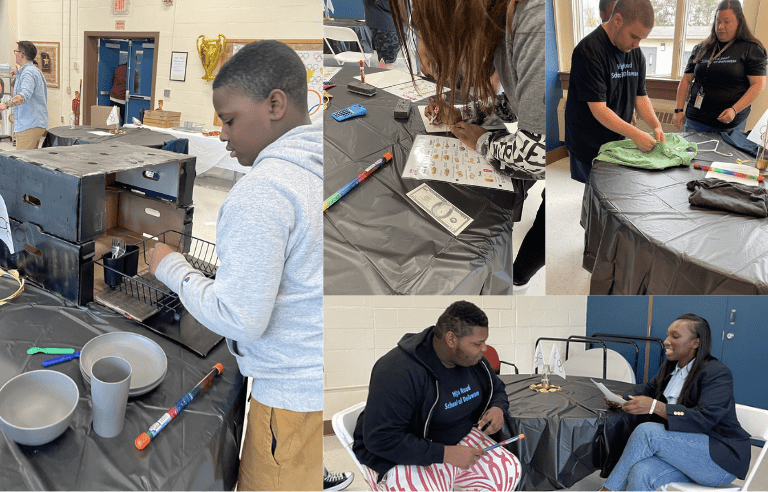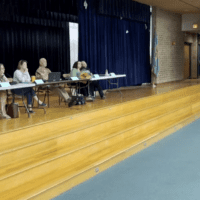

The 3rd annual Life Skills Olympics teachers a plethora of day-to-day skills for students with unique needs.
Feeding off the positive energy, flashing of cameras and fast-paced competition, Mia Rooks helped her team bring home a trophy in the third annual Life Skills Olympics.
At the same time, the competition will help the 17-years-old with her transition plan of attending a four-year university to pursue a degree in social work.
“It was an exciting energy, this is my second year going but my first year participating in it last year, I went and I cheered the team on,” Rooks said, “and this year, it was exciting. It’s very loud, but it’s a great energy and it’s nice being there with them.”
The junior at High Road School of Sussex County is one of a few dozen that competed in the event involving six High Road Schools across Maryland and Delaware.
Southern Delaware was the year’s winning team composed of students from the High Road School of Sussex County in Georgetown and the High Road School of Southern Delaware in Felton.
“Our transition team all comes together and we throw our ideas for what we think would be sufficient for life skills training,” said Dan Jones, transition coordinator at both the Georgetown and Felton High Roads Schools. “We went with some old competitions and then we tried to spice it up a little bit because students could get used to certain things and then it was too easy, so we want to make it a little bit challenging.”
He said the challenges were based on what staff knows the schools’ students have difficulties with.
At this year’s Olympics, taking place at the High Road School of Cecil County in Maryland, students participated in seven challenges, including:
- Clean-Up Challenge
- Speed Interviewing
- Menu Math
- Hanging, Folding, Buttoning Clothes
- Dishwasher Challenge
The lighthearted event is part of the programming designed to give students at these schools an opportunity to participate in true-to-life jobs within the school setting.
The end goal of the program is to develop the students’ employment skills and social skills in order to maximize their potential for success in the real world.
“The first one we did was a cleanup challenge, where they had to sweep, they had to use their hand-eye coordination to get it in the dustpan and then into the trash can,” said Morgan Facciola, transition coordinator at the High Road School of Cecil County.
The menu math challenge tasked students with picking items off a food menu to order and making sure they have the correct amount of money to pay as well as ensuring the correct change is given back to them.
“There’s typically a transition coordinator or staff member at each station that gives the kids an ‘okay’ to move on to the next one and they carry around a baton to each station, that way it shows that they completed each station,” Facciola said.
The speed interview station helped enforce proper etiquette.
Students would give the interviewer a handshake, make eye contact throughout, answer three questions typical to a job interview, as well as picking out an appropriate female and male outfit to wear.
The dishwasher challenge aimed to make sure students knew how to sort dishware by putting dishes in a dish strain appropriately without them falling over or breaking.
Another challenge involved wants versus needs, where students had a certain number of items from a fish bowl and had to place them in the proper category of either a want or a need.
Wesley Washington, an assistant transition coordinator at High Road School of Southern Delaware, said the competition helps develop the minds of students, both academically but also as a holistic person.
“Especially for our older kids, because coming out of high school, they won’t give you like the pamphlet on how to live, how to pay bills, how to organize your clothes or anything like that,” he said. “Most of the time in school, they just teach you math, science, reading, the regular curriculum.”
The Life Skills Olympics, he said, helps the students get a head start on what life is going to be like when they graduate from school.
The High Roads Schools serve students who have intellectual emotional disabilities as well as those on the autism spectrum.
“They all have IEP, so individualized education programs, which pretty much rechart their objectives and their goals, as well as what they’re going to do for career readiness at our school,” Jones said.
Rooks, who’s been in the High Roads School for four years, said the Life Skills Olympics is one of the best events at the school each year, one she and her peers look forward to.
The event that was most challenging for her was the math menu one where she had to get the proper change back for her order.
Her favorite was the hanging, folding and buttoning clothes challenge.
“It’s very time-constricting because you’re under a timer,” she said. “Buttoning them is really hard and missing a button and replacing it is hard, but I thought that was really fun.”
Rooks, whose smile and positive energy is contagious, said the Olympics presented life skills that everyone, regardless of ability, can improve on, use in the real world, and have under their belt to better themselves.
“Most of them are things we do daily, like you go to a store, you order food or you hang up your clothes, you wash clothes, you have to put your dishes away,” she said. “It’s daily stuff, so I need to learn these things.”


Raised in Doylestown, Pennsylvania, Jarek earned a B.A. in journalism and a B.A. in political science from Temple University in 2021. After running CNN’s Michael Smerconish’s YouTube channel, Jarek became a reporter for the Bucks County Herald before joining Delaware LIVE News.
Jarek can be reached by email at [email protected] or by phone at (215) 450-9982. Follow him on Twitter @jarekrutz and on LinkedIn
Share this Post








